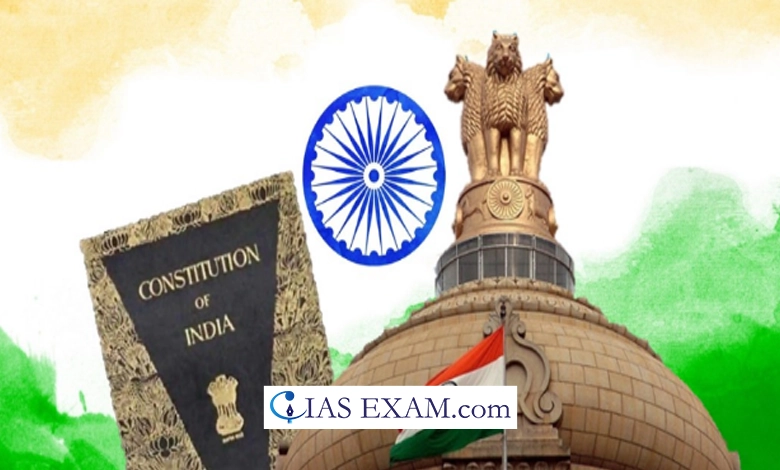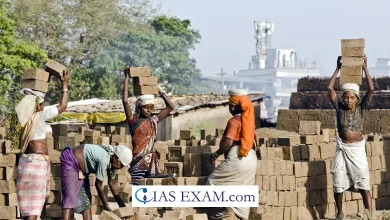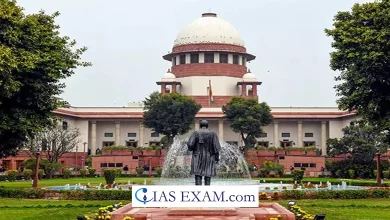Daily Current Affairs for UPSC
Article 244 (A) of Indian Constitution
Syllabus - Polity & Governance [GS Paper-2]

Context
In the Diphu Lok Sabha constituency in Assam, candidates from all political parties have pledged to put into action Article 244(A) of the Constitution, which aims to establish an autonomous region, almost like a separate government within the state.
Key Highlights
- Diphu is the most sparsely populated of Assam’s 14 Lok Sabha constituencies, with only 8.9 lakh voters.
- It is reserved for Scheduled Tribes (STs), and covers six legislative Assembly segments in 3 tribal-majority hill districts of Assam: Karbi Anglong, West Karbi Anglong, and Dima Hasao.
- These three districts are administered under the provisions of the Sixth Schedule of the Constitution.
- These areas come under two independent councils: the Karbi Anglong Autonomous Council (KAAC) and the North Cachar Hills Autonomous Council.
- Voters on the seat belong to diverse communities: Karbi (the third largest tribe in the country), Dimasa, Hmar, Kuki, Rengma Naga, Zeme Naga, Bodo, Garo, Assamese, Gorkha, etc.
Article 244(A) of the Constitution
- 22nd amendment act of 1969
-
-
- The Constitution (22nd Amendment) Act of 1969 introduced Article 244(A), permitting Parliament to create an autonomous region in Assam.
- This area needs to consist of positive tribal areas like Karbi Anglong.
-
- Key highlights
-
- In this autonomous area, there may be a separate governing frame, like a Legislature or Council of Ministers, or both.
- This provision is more superior than what is currently in place under the Sixth Schedule for those regions.
Difference from the Sixth Schedule of the Constitution
- Under the Sixth Schedule, there are already councils with elected representatives for decentralized governance in tribal areas.
- However, those councils have restricted powers. They can’t control regulation enforcement, and their economic authority is also restrained.
- On the other hand, Article 244(A) demands for more autonomous powers to tribal regions. Among those the most critical power is the control over law and order.
Demand for autonomy
- History of Autonomy Demand
-
-
- The demand for autonomy in the hill areas of undivided Assam dates back to the 1950s, with a movement seeking a separate hill state.
- This movement in the end caused the formation of Meghalaya as a full-fledged state in 1972.
- Despite this, leaders in the Karbi Anglong region chose to remain with Assam, motivated through the promise of autonomy under Article 244(A).
-
- Role of Autonomous State Demand Committee (ASDC)
-
-
- ASDC, set up as a mass organization advocating for regional autonomy, played a pivotal function.
- In 1995, the ASDC, alongside local student bodies, reached a Memorandum of Settlement with state and central governments.
- This agreement aimed to reinforce the powers of the 2 autonomous councils in the area by increasing the variety of departments under their charge from 10 to 30.
-
- Political Representation and Insurgency
-
-
- Frustrated by the elusive nature of autonomy, the decision for implementing Article 244(A) escalated into armed insurgency through the years.
- Both the Delhi and Guwahati governments have engaged in peace negotiations with militant companies, such as the Karbi and Dimasa factions, signing several peace accords within the system.
-
- Peace agreement
-
- In 2021, a peace agreement was signed with 5 militant organizations in Karbi Anglong.
- These organizations covered Karbi People’s Liberation Tigers, People’s Democratic Council of Karbi Longri, Karbi Longri NC Hills Liberation Front, Kuki Liberation Front, and United People’s Liberation Army.
- Under this agreement, more autonomy and a special development package deal of Rs 1,000 crore over 5 years have been promised.
- In 2023, an agreement was signed with the Dimasa National Liberation Army alongside the same tracks.
Source:The Indian Express
UPSC Mains Practice Question
Q.Article 244 of the Indian Constitution relates to the administration of scheduled areas and tribal areas. Analyse the impact of non-implementation of the provisions of the Fifth schedule on the growth of Left wing extremism. (2013)





.png)



